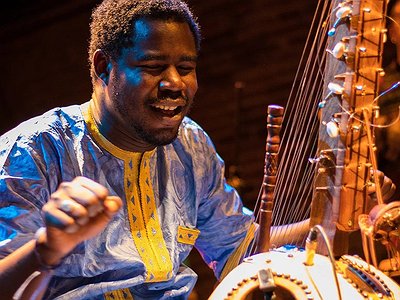Name: Boubacar Cissokho
Occupation: Kora player, composer, improviser
Nationality: Senegalese
Current event: Boubacar Cissokho can be seen performing live in and around Paris. Visit his facebook profile to stay up to date on his activities.
If you enjoyed this interview with Boubacar Cissokho, visit his excellent and informative personal website.
For more perspectives from a colleague kora player, we also highly recommend our Ballaké Sissoko interview.
Where does the impulse to create something come from for you? What role do often-quoted sources of inspiration like dreams, other forms of art, personal relationships, politics etc play?
What the impulse is, in its very essence, is simply to make things work. To give a beautiful form to the musical twists and turns that define a piece. And then to integrate this oriignal impulse across all the other instrument involved.
In a way, it is all about maintaining its value by expressing it through different forms.
The role it plays is to give provide more harmony, especially with the improvisations. That's how I would put it.
For you to get started, do there need to be concrete ideas – or what some have called a 'visualisation' of the finished work? What does the balance between planning and chance look like for you?
Yes, it can be like that, and there can actually be some preparation involved as well.
As far as leaving things to chance is concerned, there is no such thing in my opinion. Music needs to be open so you can get it across.
Is there a preparation phase for your process? Do you require your tools to be laid out in a particular way, for example, do you need to do 'research' or create 'early versions'?
Yes indeed, there is always a preparation phase if not 'ayayayaya', as they say.
Honestly I don't know. What I do know is this: Often, the creative spark will hit me at the very last minute.
Do you have certain rituals to get you into the right mindset for creating? What role do certain foods or stimulants like coffee, lighting, scents, exercise or reading poetry play?
No, I don't have any rituals. I wouldn't know how to answer that, sorry.
Once you've started, how does the work gradually emerge?
You have to have the form first of all to better intervene in certain pieces. Also, the audience plays a role in certain aspects. They help me to get into the required spirit while playing.
Is there an element of spirituality to what I do? Yes, traditionally so.
Once a piece is finished, how important is it for you to let it lie and evaluate it later on? How much improvement and refinement do you personally allow until you're satisfied with a piece? What does this process look like in practise?
You need somethjing you want to communicate first, something to start with and to finish with. So you have to know how to start in order to know how to finish.
This all depends on the artist who is creating a piece of performance.
What’s your take on the role and importance of production, including mixing and mastering for you personally? How involved do you get in this?
It's not my field, I leave it to the sound engineers.
After finishing a piece or album and releasing something into the world, there can be a sense of emptiness. Can you relate to this – and how do you return to the state of creativity after experiencing it?
Satisfaction. Because to give the world what it needs, we kill ourselves. We suffer to know if what is going to come out will please the listeners. It is the audience, with their judgements and feedback, who give us the strength. So let us be surprised by this experience.




